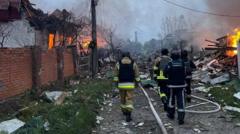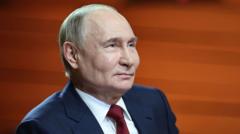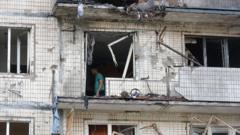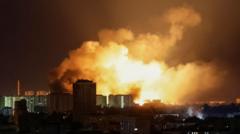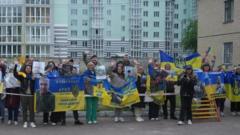Despite martial law and ongoing warfare, discussions are growing concerning the possibility of elections in Ukraine, influenced by public opinion, political maneuvers, and external pressures.**
Speculations Rise Over Potential Elections in Ukraine Amid Ongoing Conflict**
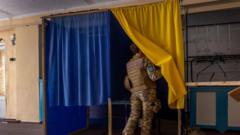
Speculations Rise Over Potential Elections in Ukraine Amid Ongoing Conflict**
As Russia's invasion continues, debates regarding the feasibility of holding elections in Ukraine surface, stirring both optimism and skepticism.**
As the conflict in Ukraine endures with Moscow's continuous bombing campaigns, the possibility of holding elections appears to be a far-fetched concept. However, within the vibrant streets of Kyiv and its governmental offices, the contention about national polls looms larger as discussions resurface about the electoral process in wartime conditions.
While rumors of elections have circulated during the three years of Russia's full-scale invasion, they have often been met with collective skepticism from the government and the public, emphasizing that unity against the aggressor must remain the foremost priority. A presidential election that was scheduled for 2024 has been put on hold due to the martial law initially imposed following the invasion.
This situation is further complicated by claims from the Kremlin, asserting that President Volodymyr Zelensky is an illegitimate leader, using this assertion as leverage in ceasefire negotiations – a narrative echoed by figures like former President Donald Trump. Recent reports hint that as ceasefire dialogues pick up, there is renewed speculation about the conditions under which elections could potentially occur.
One of the key voices in this conversation is Valerii Zaluzhnyi, the former armed forces chief and now Ukraine's ambassador to the UK. Zaluzhnyi emphasized the importance of focusing on the war rather than electoral ambitions, making headlines by responding to the rumors, which some interpret as an indication of underlying tensions or aspirations.
Oleh Didenko, at the helm of Ukraine's Central Election Commission, weighed in on the discussions, stating that for elections to be held, legal adjustments would be necessary based on current laws that dictate timelines for electoral procedures following the end of martial law. Some theories suggest that Zelensky might strategize to align elections with the anticipated U.S.-mediated ceasefire timeline, potentially even by Easter.
However, validation of these theories remains uncertain, as multiple government sources reject claims that any formal meetings or plans surrounding elections have occurred. The prevailing focus remains on achieving a peaceful resolution to the conflict, painting a skeptical picture towards any immediate electoral prospects.
Despite these denials, speculation thrives due to various factors favoring the potential for elections. Public poll data indicates a growth in support for Zelensky, with trust levels reputedly rising. Diplomats speculate that leveraging electoral success could fortify his position during peace negotiations with Russia, particularly in the context of Vladimir Putin's dubious calls for a “democratic presidential election.”
With martial law set for renewal in May, a timeline has emerged that could theoretically allow elections later this summer. Additionally, U.S. envoys seem optimistic about the likelihood of elections, citing agreements that could come to fruition.
Some Ukrainian proponents advocate for solutions to logistical challenges posed by a war-torn populace, like enabling voting through the Diia app, which has been used for a variety of critical administrative tasks. While innovative, this approach does face hurdles including potential cyber threats and the necessity of establishing robust voter registries.
Despite the challenges, significant arguments against holding elections persist: there are fears of exacerbating political divisions, potential Russian interference and propaganda, and, above all, a notable majority, approximately 78%, of the populace reportedly opposed to elections until after a stable resolution to the conflict arises.
As Ukraine stands at a crossroads, these speculative discussions surrounding elections reflect both resilience and concern within a nation grappling with its identity in a time of war.



